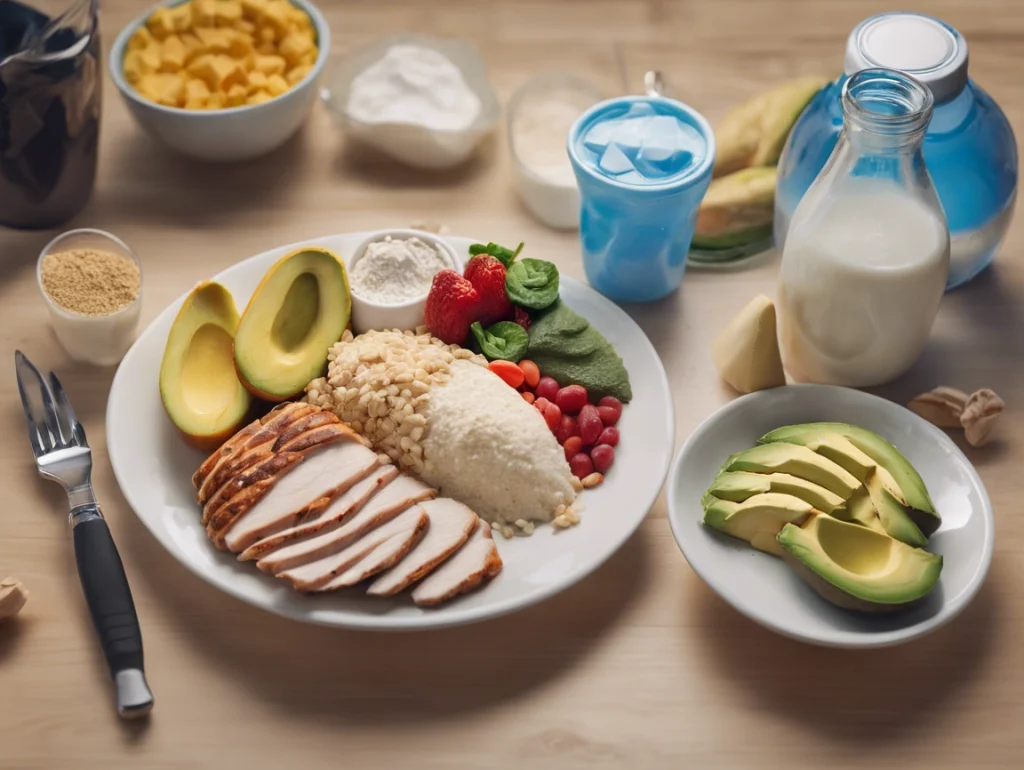When building muscle quickly, exercise alone won’t get you there. Nutrition plays a key role in maximizing muscle gains. The right combination of food helps repair and grow muscle fibers, giving you the gains you’re after. Let’s dive into five key nutrition strategies to supercharge your muscle-building efforts and deliver faster results.
What Role Does Protein Play in Muscle Gains?
Protein is the foundation of muscle growth. It’s made up of amino acids, the building blocks of muscle tissue. To maximize nutrition for muscle gains, aim to consume a high-protein meal or snack every three to four hours throughout the day.
How Much Protein Should You Eat for Muscle Gains?
Research suggests that consuming 1.6–2.2 grams of protein per kilogram of body weight daily is ideal for muscle growth. For instance, if you weigh 70 kg, you should aim for 112–154 grams of protein daily. This consistent intake ensures your body has the necessary resources to repair and build muscle after workouts.
Examples of high-protein foods include:
- Chicken breast (31 grams of protein per 100 grams)
- Greek yogurt (10 grams of protein per 100 grams)
- Eggs (6 grams of protein per large egg)
For added convenience, protein shakes can help meet your daily goals when whole foods aren’t available.
Why Are Carbs Important for Muscle Growth?
Carbohydrates are the primary energy source for your muscles during workouts. When you eat carbohydrates, your body converts them into glycogen, which fuels your muscles during intense exercise. Without adequate carbs, your workouts will suffer, and so will your results.
What Type of Carbs Should You Focus On?
For nutrition for muscle gains, focus on complex carbohydrates that release energy slowly. This includes foods like oats, brown rice, and sweet potatoes. These carbs provide sustained energy throughout your workout and help replenish muscle glycogen stores after training.
To maximize muscle recovery, consume about 3-5 grams of carbohydrates per kilogram of body weight daily. A balanced post-workout meal with protein and carbs is essential for quick recovery and muscle growth.
How Can Healthy Fats Enhance Muscle Growth?
Fats are often overlooked, but they’re critical for hormone production, including testosterone, which plays a vital role in muscle growth. Ensuring you get enough healthy fats in your diet can help maintain hormone balance and support muscle building.
What Types of Fats Should You Include?
Focus on incorporating unsaturated fats like:
- Olive oil
- Avocados
- Nuts and seeds
These fats not only support hormone production but also provide a calorie-dense source of energy, which is vital if you’re aiming to gain muscle mass. About 20-30% of your daily calories should come from healthy fats to optimize nutrition for muscle gains.
Why Is Staying Hydrated Crucial for Muscle Growth?
Muscles comprise around 75% water, so staying hydrated is essential for muscle recovery and performance. Dehydration can lead to reduced strength and endurance, which hinders muscle growth.
How Much Water Do You Need?
Drinking at least 3-4 liters of water daily is a good rule of thumb. However, your water needs may increase based on your workouts’ intensity and overall calorie intake. Adding electrolytes to your water during longer or more intense workouts can enhance performance and recovery.
Do Supplements Help with Muscle Gains?
While whole foods should always be your first option, supplements can help fill the gaps in your nutrition. The right supplements, paired with a solid diet, can significantly boost your muscle growth efforts.
Which Supplements Are Best for Muscle Growth?
Here are the top supplements that support nutrition for muscle gain:
- Whey protein is fast–digesting and rich in essential amino acids, perfect for post-workout recovery.
- Creatine – Increases muscle strength and performance during high-intensity exercises.
- BCAAs (Branched-Chain Amino Acids) – Help reduce muscle soreness and enhance recovery.
These supplements can provide the additional nutrients your body needs to recover and build muscle, especially during intense training.
Key Takeaways for Maximizing Your Muscle Gains
Building muscle isn’t just about lifting heavy weights; it’s also about fueling your body with the right nutrients. Focusing on nutrition for muscle gains through consistent protein intake, smart carbohydrate choices, healthy fats, adequate hydration, and effective supplementation will help you maximize your results.
Remember, your diet builds the muscle, while exercise supports those gains. Stay committed to a nutrition plan that aligns with your muscle-building goals, and you’ll see the results you’re after in no time.




